|
Bauhofer freed on bail

Thomas Bauhofer (right) with ringleader Peter Gerd
Bernert at their arrest in March. Bernert is still behind bars, but thanks to an
inexplicable bail arrangement, Bauhofer is now roaming around a free man.
Thomas Bauhofer, an Austrian criminal and one of four men who
planned and carried out the brutal murder of a much respected school teacher in
Pattaya last December, has been able to flee the country after a judge in
Chonburi allowed him bail of 1.5 million baht.
Police authorities in Germany and Austria were believed to be stunned by the
decision.
Bauhofer was one of a gang of four men, all of whom have criminal records in
their own country, who cold bloodedly planned the murder of Guido Raffenberg,
the Deputy Head of the Anne Frank Gymnasium in Werne, Germany. The ringleader,
Peter Gerd Bernert, a German, is still in Chonburi jail.
Two others, Austrian Mario Russ and German Bochard Roesler, have been arrested
after fleeing back to their home country. Together with Bauhofer they are also
accused of robbing a translation service in Zurich at gunpoint while on the run.
Bauhofer’s release followed the arrival in Thailand of his mother, a rich
property owner from Innsbruck. Bauhofer was given bail on May 21 on the
condition he surrender weekly.
Not surprisingly, Bauhofer, who made a full confession both to German Federal
Police and Police Lieutenant Thanomsak Intrabutr of the Pattaya Tourist Police,
did not return. He faced a life sentence.
No record has been made that Bauhofer has left the country but police suspect he
may have slipped into a neighbouring country and will now be looking for a new
I.D. His kataoey girlfriend has also not been seen in Pattaya recently. He had
bought her gold bracelets from his share of the US$20,000 the four men had
gleaned from Mr. Raffenberg’s credit cards.
Mr. Raffenberg was a popular teacher. He was gay but this did not interfere with
his work at the school, and in fact he was so discreet that it was not common
knowledge.
He had said goodbye to the pupils before his Christmas break and was met at Don
Muang airport by Bernert, who had already plotted with the three others to kill
him.
Pattaya Mail reported the murder in full in our March 14 issue. The four men,
who only wanted Raffenberg’s cash, originally planned to get him drunk and run
over him. But they changed their plans and instead took him out drinking and to
a local reservoir where Rosler and Russ were waiting with shovels to beat him
over the head and bury him. They killed him but the ground was too hard and they
were too lazy to bury him. So they burned his body.
A day later, Rosler returned and cut off his head. He drove around Pattaya with
the head in a bag in his Honda Dream motorcycle before throwing it away in waste
land.
The men were traced through the use of Raffenberg’s credit cards.
The disappearance of Bauhofer makes a mockery of the government crackdown on
foreign crime in Pattaya. No foreign police liaison officers, (14 countries are
represented by foreign police in Thailand) were ever consulted about who the
foreign criminals were before they sent 1,000 officers to Pattaya to do little
more than disrupt the traffic. Yet, according to one foreign officer based in
Bangkok, “Pattaya has a list of criminals from my country which reads like a
‘Who’s Who’ for low lifes.”
Pattaya Mail strongly defends the international image of our city and will
continue to expose publi-cations which lie about conditions here. But our task
becomes increasingly difficult when the local police continue to extort cash
from foreign tourists for misdemeanors and treats foreign murderers as visiting
royalty.
People like Guido Raffen-berg, who spent a lifetime giving his services to
education, and other tourists guests here, need to know they will receive the
full protection of the law. At the moment, Bauhofer’s release demon-strates this
is clearly not so. The question remains, what are the circumstances under which
he got bail?
If under the table money was paid in a corrupt deal, the dead man’s family back
home could be forgiven for feeling that Mr. Raffenberg was killed by a society
that kissed civilisation goodbye.
Bauhofer, police are confident, may not be on the run for long. When they bring
him back, maybe he will have more confessing to do.
Update: An inside source, and thus unconfirmed, revealed that Bauhofer actually
paid 2 million baht to get out of jail, yet only 1.5 million was listed on his
bail bond. The source also stated that a lawyer has approached Bernert with an
offer of 1.5 million baht to be legally set free, citing Bauhofer’s release as
an example.
|

|
Hundreds fined as police once again enforce the helmet law
Helmet law enforcement
Without prior warning, Pattaya police have once again
begun enforcing the national helmet law.
Instituted three governments ago to try and decrease the alarming number of
tragic road deaths, the national helmet law was introduced to Pattaya with
much publicity back in January of 1996. Since that time, however, police
became lax in enforcing the law and most of the area’s motorcycle riders
gradually stopped adhering to it.
This all changed about two weeks ago when police once again began to stop
helmet-less motorcycle drivers at all intersections. Police did this without
notifying the media or installing warning signs around town. After all, the
law is the law.
Police have been diligent in enforcing the law, stopping all motorcycle
drivers without helmets. So far, pillion riders without helmets are being
ignored, even though the law states that anyone riding on a motorcycle must
wear a helmet.
Fines have reduced from the 500 baht charges meted out when the law first
came into existence to 200 baht today.
The police say citizens have very lackadaisical attitudes toward their own
lives and it has come to the point that force must be used. Officers point
out that this law is not unreasonable and was made to protect lives and not
to annoy people.
|

|
Austrian embezzler busted
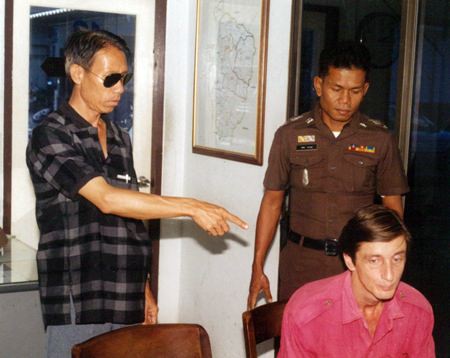
Joy points out Bela as the
culprit who embezzled 200,000 baht from him.
Fifty-three year old Joy Panjajom led police to an
Austrian national, Bela Rabel-Baver, and asked for his arrest on charges of
contract violation stemming from a sour business deal involving money in
exchange for jobs in Japan.
From questioning, police learned that Joy had met Baver in Payao Province
last year. At that time, he asked Joy if he and 4 of his relatives would be
interested in working in Japan. The fee for Baver’s services would be
200,000 baht. A short time later, Joy visited Baver’s office in Bangkok and
gave him the money. They signed a contract at that time.
Two of Joy’s relatives were sent to Japan but then problems arose and Baver
fled Bangkok and came to live in Chonburi. Joy had been seeking him for
months and finally learned his whereabouts.
He asked Pattaya police to charge Baver with violation of contract and fraud
but Pattaya police informed him that this was out of their jurisdiction and
he would have to be charged in Bangkok. Police did arrest Baver for not
having a valid passport, though. They will soon send him to Bangkok, where
Joy may file charges.
All conversations about what kind of work was to be done in Japan was rather
nebulous. Payao province has the rather sad reputation of selling female
children, especially the Dork Kham Tai District. Most of these women are
sent to Japan. Neither did anyone mention what sex Joy’s relatives were.
|

|
Crime clean-up nets
an unbelievable catch
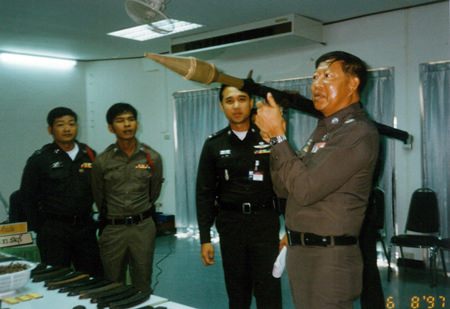
Police demonstrate some of the
weapons confiscated in the early June crime clean-up.
The Chonburi regional police gave a news conference in
which they told of the results of a crime ‘clean-up’ which lasted from June
4-8, 1997. The police were very satisfied with the results.
Following the central government’s policy of totally eradicating crime in
all regions of the country, police managed to round up 1,644 wanted
criminals who had been involved in vice, narcotics and other crime.
Thousands of illegal firearms and munitions were confiscated, including many
AK47s, UZIs, and shoulder launched rockets.
Dealers and drugs such as heroin, opium, amphetamines, Krathorm leaves
(which have a stimulant effect similar to cocaine), solvents and marijuana
were discovered.
Pornography and venues for prostitution were closed or fined.
Kuwaiti held for illegal possession
of drugs
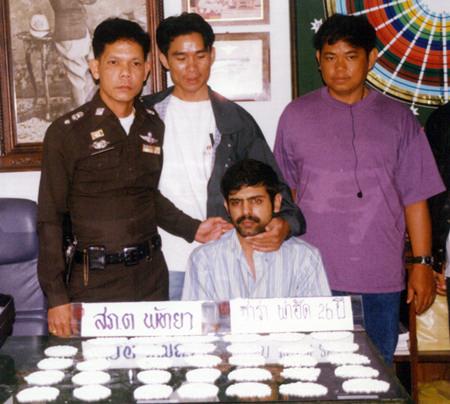
Sama Fahad was arrested last week for possession
and distribution of psychotropic drugs.
Police investigations revealed that Sama Fahad, a Kuwaiti
national, was smuggling pharmaceutical tranquillisers out of the country, as
well as selling them in Thailand.
Receiving full co-operation from the staff of the Cherry Inn in South
Pattaya, police obtained the key to Sama Fahad’s room and surprised him as
he was putting the tablets into plastic bags for export.
He had been coming to Thailand for over two years and bought the tablets
from a Thai contact. In Thailand he charged foreigners 100 baht a tablet and
Thais paid 40 baht. When in Kuwait, he charged 300 baht a tablet.
The drug confiscated was a registered licensed tranquilliser made by an
international pharmaceutical firm. Fahad was charged with having
psychotropic drugs in his possession without a prescription.
Golf course scam comes to an end
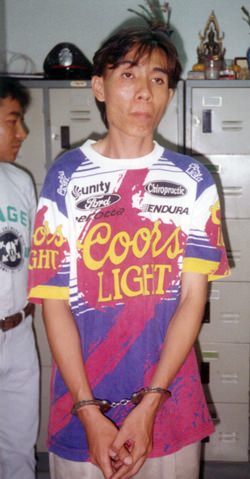
After enough complaints had
come in to police, Kritsana was arrested for extorting money from golfers.
Bangkok resident Kritsana Kengthanakarn, 28, was arrested
in Pattaya last week, bringing to an end his series of extortion crimes
played out on local golf courses.
Kritsana, whose usual profession is waiting on tables, confessed that he had
been posing as an employee on as many as five different golf courses. He
would approach mostly Japanese golfers on the green and demand between
20,000-40,000 baht from them each time, telling his marks that these were
usual green fees. He said he targeted Japanese golfers because they had the
most money. He also said that the golfers believed his ruse.
Many golf courses had filed complaints with the police, and after his
arrest, owners of the various golf courses at which he had been operating
came to the police station to identify him.
Kritsana is being held on charges of extortion and fraud.
Money’s tight, another bar girl rift with tourist
An altercation between a Kuwaiti tourist and a Thai bar
worker last week prompted both parties to seek help at the police station.
The woman told the officer on duty that they had come to an agreement for
sexual activity, for which the Kuwaiti would pay her 500 baht. But when they
were in the lift of the tourist’s hotel, he suddenly changed his mind and
tried to push her out of the elevator. Like all good business people, she
tried to tell him a deal was a deal. The tourist became angry and told him
to stop pestering him. He had a bottle of liquor in his hand which he threw
backhanded against the wall of the lift. The vessel shattered and a flying
shard of glass opened a 5 inch long laceration on the woman’s arm.
After having the wound cared for at the hospital, she requested the tourist
pay her 3,000 baht in damages for the wound and lost work time at the bar.
Officers then asked the tourist for his version of the incident. He told
police that he had not hurt the woman. He did not want to sleep with her.
That’s why he threw her out of the lift.
He told police he had not gone to a bar and had seen her for the first time
in the lift. She wanted him to engage her for sexual services. He wasn’t
interested and she continued to badger him. He become angry and threw the
bottle. She happened to be in the way of the flying glass.
The Kuwaiti said he came to the police station as he wanted to make sure
that the problem was solved and the police had records of it so the woman
could not fabricate more stories. He continued, saying he had been coming to
Thailand for more than 10 years, but this had soured him on the country and
he would not be coming back.
He gave the money to police and asked that they detain the woman at least 5
minutes before giving it to her, so he could get back to his hotel and lock
him self safely away from his tormentor.
|

|
Slaughterhouse 9 detained for speed dealing
Police learned from a source that amphetamines were being
sold in a slaughterhouse on Soi Mor Ngob Reu in Banglamung. This was being
done in the most brazen fashion and had been going on for quite some time.
A special squad of police was formed to bring the dealers to justice.
Storming the abattoir, the squad was able to arrest the entire gang of 9 who
had been selling this very dangerous drug to labourers, students, motorcycle
drivers and young people.
The leader of the gang, Piak Pongsak, 30, was caught with 71 tablets of
amphetamine on his person. He was also carrying 4.6 grams of amphetamine
powder in a plastic bag.
Police then searched the gang’s residence, which was inside the
slaughterhouse. They found a total of 44 more tablets on other gang members.
Some admitted to using the drug themselves.
A full search turned up a total 205 amphetamine tablets. These and the
suspects were all taken to the police station.
Police told the media that these arrests were a part of the government’s
campaign to totally eradicate amphetamine use, which is permeating the whole
country as it tries to keep up with the pressures of the modern world.
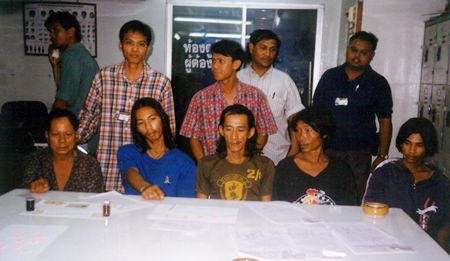
|

|
Eviction leads to arson
An evicted tenant is the prime suspect in what police believe to be arson at
a local boarding house in South Pattaya last week.
In the apartment police found that the bed had been burned, the portable
electric fan melted and the ceiling blackened by the blaze.
Witnesses, including Visit Watanatham, the owner of a row of shophouses
divided into rental rooms in Bangla-mung, across from the Grand Hor market
in South Pattaya, told police they saw a man known only as San run past them
after they smelled smoke emanating from Apt. M-5 in the building. San
previously had been evicted from the building for non-payment of rent.
After they extinguished the blaze, the four witnesses and Visit formed a
posse to find San, but he had disappeared.
Police surmised that the young man, who was an employee of Boys, Boys, Boys,
was trying to get revenge for being thrown out of the apartment.
Police are now searching for him.
News briefs from the police files
Police arrested an Aus-trian tourist with ap-proximately 10 grams of
marijuana in his possession. He was sent for trial before he could follow
what police refer to as his ‘natural inclinations’ and begin selling the
drug.
***
Law enforcement officials closed 6 establishments which were showing motion
pictures without a licence. The owners of the illegal theatres were arrested
and fined 1000 baht per motion picture shown.
***
A police squad arrested a group of Kuo-Min-Tang Chinese or Jeen Hor who were
acting as tourist guides at various attractions in Pattaya. The Jeen Hor,
who fled from China to Thailand after the revolution, are known for their
intelligence and education. They are being charged with acting as guides
without a license.
***
A Norwegian fell from the 7th floor of a condominium and was rushed to
hospital. Despite doctor’s efforts, the man died. The man’s wife was
sleeping in the room at the time. Police are investi-gating the cause as
there was a 1 metre awning extending from the building and an accidental
fall seems very unlikely.
***
A Chinese tourist was robbed at his hotel. Police investigations showed the
room maid had done it. The tourist left his room and when the woman went in
to clean, she found approxi-mately 20,000 baht in Hong Kong Dollars and
Chinese Yuan. She stuffed the money in the soles of her shoes and walked out
of the tourist’s room. Canny police discovered the ruse and she was
arrested.
|

|
If you tip the bottle, pay your bill
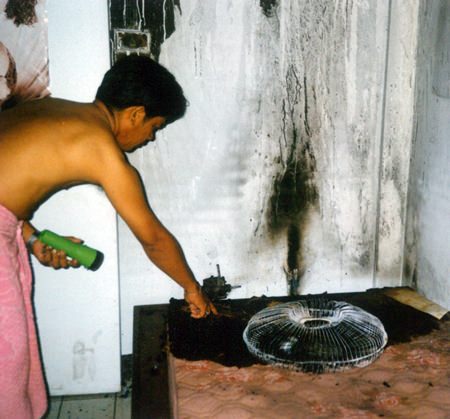
Police received a report that an American tourist,
Radford Reed had been drinking in a local bar and had skipped out on his
bill.
The manager told police that the American had drunk 150 baht worth of beer.
When an employee asked him to pay his bill, the tourist ran out of the bar.
Luckily, a patrol car happened to be passing by and staff wailed for help.
They asked police to arrest the man, who lives on the ground floor of the
Diana Estates Condo.
When asked why he did not pay his bill, the man told them he had no money.
When asked if he had a passport, he denied that also.
He was charged with being in the country without proper travel documents and
non-payment at the restaurant.
He now awaits process of law.
June 26 - Anti-Drug
Abuse Day
Naval Commander Chalita Vithwan, Head of the Public
Relations for Somdej Hospital, which is a part of the Department of the
Navy, told reporters that June 26 would be official ‘Anti-Drug Abuse Day’,
with many consciousness raising activities to be held between June 19-26.
The HM Queen Sirikit Hospital realises the importance of the drug abuse
problem in the navy and public sectors. The hospital will have exhibitions
dealing with addictive and controlled substances and their abuse, special
attention being given to solvents and amphetamines, the abuse of which has
reached epidemic proportions in Thailand.
The exhibition will be held on the ground floor of the out-patient building.
It will include slide shows, free flyers and informative documents.
On June 19th, a special lecture will be held in the meeting room of the
hospital, with experts from government departments providing information.
Attending the lecture will be government officials, nurses from various
hospitals, teachers from 45 schools in the area and Buddhist monks.
The general public is invited to attend these informative meetings at no
cost.
|

|
YWCA continues community support
Sansak Ngarmphiches, the Head of the Government Committee
on tourism, presided over the installation of the new board of directors of
the YWCA. Mrs. Vilawan Hengtrakul was appointed managing director for
Chon-buri.
After the ceremony, Mrs. Vilawan told reporters that her appointment was a
great honour and responsibility. She said she would do her utmost to
continue to implement the YWCA’s various community projects to the best of
her ability. She has a special interest in the projects which are aimed at
preserving the unity of the nuclear family. Another of her interests is
disadvantaged children in the various communities in Pattaya. She believes
that education is the foundation of all progress.
Mrs. Vilawan stressed that a concerted effort by the com-munity must be made
in ensuring all children receive proper education. She believes that first,
people must learn about education and the value of it, as some sectors of
society believe that children working and bringing home a bit of money is
more help. She said this is a very short-sighted viewpoint and shows when
the adults who missed education are not able to function in society.
|

|
40th Muslim Youth Day
The Muslim Society of Pattaya is presenting scholar-ships
to young people in the area.
Mr. Faruk Wongborisuth and Pairat Suthithamrong-sawat, Mayor of Pattaya will
preside over the 40th Muslim Youth Day, which is organised to gather funds
for scholarships, expansion of school buildings and the purchase of school
supplies for the Deenul Islamiya School.
The school was opened 2 years ago and has 50 students. There are also 80
students doing Koran studies. Most of the students come from poor families.
Many activities are planned to help raise funds to keep these young people
in school.
There will be a lecture on ‘Young People and Drugs’, and various
exhibitions.
A total of 130 scholarships will be presented to young people.
Mayors meet to change current system
by Kittisak Khamthong
The question of regional identity in Thailand is a very
sensitive one for the central government. Being a country with four dialects
as different from each other as Spanish, Portuguese and Italian, there are
considerable differences between the regions. This has often caused
resentment, as the government’s line on “we’re all Thai” is not generally
accepted as being totally true.
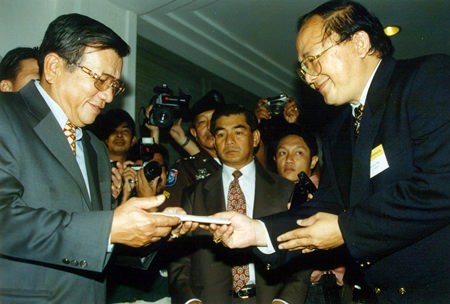
The people of Isan, for example, technically do not speak Thai, but a
dialect of Lao. They call their language Lao, refer to themselves as Lao and
can communicate with a native of Vientiane much easier than with a Bangkok
native, who speaks central Thai.
The one thing that binds all Thai citizens together is their loyalty to His
Majesty the King as their sovereign.
In the recent past, the government’s policy has been to de-emphasise the
cultural differences between the regions. This has been done by setting up
various ‘security’ agencies, which monitor the activities of groups in the
various regions. It has all become so complex that there are now six
different methods of governing used in the various regions.
There are 7,640 different areas, divided into 147
municipalities, 987 sub-muni-cipalities, 75 ‘Provincial Administrative
Organisations’, 6,397 ‘Special Sub-District Administrative Organisations’
and the City of Pattaya, which is a special case, and Bangkok, which has its
own government. These names are all rather arbitrary and it is not easy to
find an exact English equivalent.
All these organisations are controlled by the all-powerful Ministry of the
Interior which in turn is controlled by one governor. So, in fact, all these
different organisations derive their power from one person in Bangkok.
A new approach was proposed at a very important meeting of mayors from the
various regions. This was the meeting concerning another organisation, the
Office for the Administrative Governing of the Various Regions.
The mayors from the 4 regions would like this mind boggling array of
organisations reduced to ‘The Regional Department’, which would be the only
organisation overseeing regional affairs.
Rather than helping the regions develop, as is the purported aim of all
these various organisations, the result is a tangle of bureaucratic red tape
which puts many regional affairs on hold or causes them to be lost in a
bureaucratic limbo. When a region wishes for something to be done, it seems
that one office must receive permission from all the others before a request
can be implemented. But these offices often must go through bureaucratic
contortions and unbelievable double backs which cause frustration and
suspicion.
The convocation of Mayors, representing their respective regions, thus feels
that the Ministry of the Interior should untangle all these organisations
and streamline them into one department.
Each Regional Department would communicate directly with the Ministry of the
Interior.
Some of the present regional organisations now have more staff than the
whole Ministry of the Interior itself.
One example is the Department for Regional Development which on the
provincial level has a staff of 100,000. This one provincial department has
more staff than the entire Ministry of the Interior in Bangkok.
The Ministry of the Interior is aware of the problems this causes with
administration. Changing it would reduce the ministry’s power in provincial
affairs. It would also reduce any benefits the Ministry enjoys from the
present system.
It could be compared to a child demanding that an adult act in a proper and
reasonable fashion. The adult knows the child is right and what it asks is
reasonable, but the cannot allow itself to admit that a child is right and
do what it says.
So far, the Ministry maintains that the provinces are not ready to govern
themselves and must go through a learning process. The people in the
provinces are still not properly educated.
May we ask, who accepted the duty of supervising provincial education if not
the Ministry of the Interior itself, with its labyrinth of organisations,
which trip each other up and cancel each other out?
It is a very tricky catch 22 situation. The Ministry of the Interior is
saying they will educate the provincial people, at which they have been very
unsuccessful. Then when the provinces ask to try and reduce bureaucracy, so
education may be conducted more efficiently, the Ministry uses its own
failings as an excuse for not giving people the power to do what the
Ministry could not.
It is hoped that those who read this article are confused. Readers will then
have a clue as to how confused and frustrated the provincial people who are
governed by these laws are.
|

|
Biofication is effective in cleaning polluted water
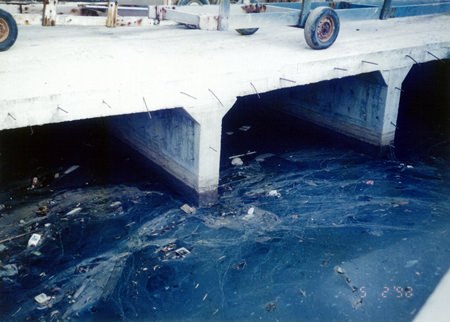
The before and after of
Pattaya Khlong.
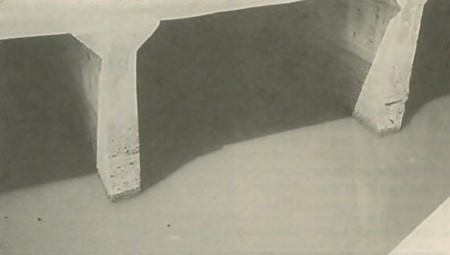
The natural environment in Thailand is degenerating at an
alarmingly fast rate. Population increase and industrial ‘progress’ have
strangled the environmental cycle which can not respond to human desires
quickly enough.
This has caused a ‘green revolution’.
Pattaya was once famous for its beautiful beaches, blue water and unspoiled
tropical environment. Blinded by the potential profits, the area was quickly
turned into a tourist centre, with no forethought or planning given to long
term environmental protection.
Some would say this ‘get what you can, now’ is a part of the Thai psyche. As
the Thais have historically been a migratory people who only stayed in Siam
when there was no other place to go, there might be a small bit of truth in
this. In the words of the Vietnamese and Chinese, ‘What can you say of a
race which builds houses on poles? They have no roots in or regard for the
earth.’
The Thai ethos of using a temple and not maintaining it is a prime example
of this. The reclining Buddha at the very important Wat Pho in Bangkok is a
blatant example. Not more than 700 metres from the Grand Palace, this
colossal Buddha Image, of which the Thais are purportedly very proud, is in
such a state of disrepair, with the gold leaf hanging off of it in huge
sheets, that visitors from other countries are quite shocked. In the past 40
years this, one of the most important religious images in Thailand, has not
had one hour of maintenance done on it. Instead of conserving these valuable
works, the philosophy is ‘build a new one.’
Many believe that Pattaya’s biggest problem is water quality. Once beautiful
canals and the sea have become oily cesspools which make the water totally
unusable for any purpose.
There are six main areas with extremely polluted water. The Naklua
community, North Pattaya, Central Pattaya, South Pattaya, Na Jomtien and
Larn Island.
Raw sewage and other unmentionable things are often poured directly into the
sea. The canals suffer from rubbish, raw sewage and chemical dumping.
Pattaya has three waste water treatment plants. These three plants treat
33,000 cubic litres of water per day. This is not much help as the per day
amount of waste water has been calculated to be 54,362 cubic litres. The
‘one rotten apple spoils the barrel’ adage applies here, as the water which
cannot be treated is enough to make the treated water unusable. This is
destroying tourism.
A group of professors from Rangsit University have been in Pattaya and are
using a new technique which is a type of germ-to germ biological warfare.
The technique, called biofication, introduces ‘good’ bacteria into the
water, which kill ‘bad’ bacteria, leaving water in the state it was before
humanity got into the act.
The professors used Pattaya canal as their testing ground for this
biofication. The khlong was full of ammonia and hydrogen sulphate. A slimy
ooze of oil covered the water’s surface. Anytime the water was moved,
malodorous gases were released. In 1996, no form of life whatsoever was
found in this khlong. After introducing the ‘good’ bacteria the canal’s
condition showed signs of improvement within 20 days. Today, the canal is a
clear brown colour and its bacteria count is almost within acceptable
standards.
Mayor Pairat Suthithamrongsawat told the media that the results were very
encouraging, but there was a problem with budgets to buy the healing
bacteria, as it must be imported and would cost many hundreds of thousands
of baht. If the project were to continue, it would have to be presented to
the Pattaya city council for consideration.
The people still wait and no decision has been reached by the city council.
Biofication can be used in canals, wells, and any bodies of fresh water,
moving or still, which need reviving. The results seem to justify the cost.
The present council’s tenure is over on June 27th of this year. We hope that
a decision will be made by some governing body soon, as everyone would like
to see nature in balance again. Even though many people in Pattaya’s bank
accounts are ‘in the black’, nature’s is still ‘in the red.’
|

|
Working to prevent AIDS
The Community Relations Office of Chonburi Province
reported that the first case of full blown AIDS in Chonburi was found in
1986. The victim was a homosexual. It then spread through various groups,
such as male drug addicts, foreigners, prostitutes, and then was discovered
in the heterosexual com-munity.
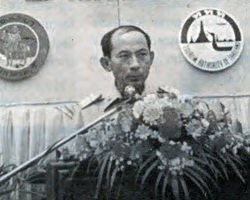 Chonburi’s
Governor, Sujarit Pajchimanan speaks out against Chonburi’s
Governor, Sujarit Pajchimanan speaks out against
the spread of AIDS.
According to local, and somewhat controversial, statistics, in February of
1997 there were 2,103 infected males and 415 females. The district with the
highest number of people infected was Chonburi City, with 25.53%. Following
are Banglamung and Sattahip with 30.06% and 19.35% respectively. AIDS
infection is increasing every year in Chonburi.
Chonburi’s governor, Sujarit Pajchimanan, is officially in charge of the
AIDS prevention and help committee for the province. The province is
therefore mobilising and using all methods possible to prevent the spread of
the virus.
A seminar for Buddhist clergy has been organised, in which 400 monks from
Chonburi will attend. The monks will be given a working knowledge of the
diseases aetiology and the various outreach and prevention methods. They
will be asked, in their positions as an integral part of community life and
respected cultural figures, to warn their parishioners and give them all
possible assistance in preventing and coping with the condition.
The monks are being requested to make sexual self control and AIDS awareness
an integral part of their sermons.
|

|
|

